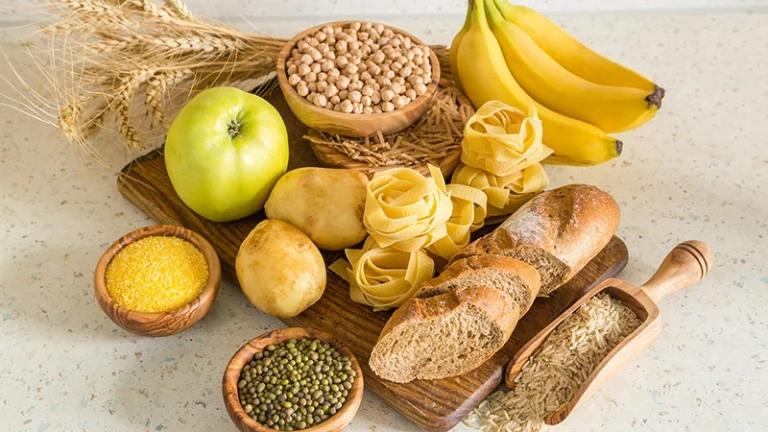
Did you know the daily recommended amount of fibre is 30 grams? According to the NHS guidelines, this is part of a healthy, balanced diet. The Dietary Guidelines for Americans, 2020–2025 recommends that adults eat 22 to 34 grams of fibre each day (depending on their age and sex). However most adults eat an average of about 20g a day, so we need to find ways to increase our intake. Let’s take a look at why dietary fibre is important and how to increase our daily intake.
🥬 Why do I need fibre in my diet?
Fibre helps to keep our digestive system healthy, move food through the gut, and maintain a healthy body weight. Fibre adds bulk to stools by absorbing water. This makes stools softer allowing them to move more quickly through the gut, making them easier to pass. Eating enough fibre can help keep things working in the digestive system and encourage bowel movements. Along with drinking plenty of fluids and keeping active, make sure you have plenty of fibre in your diet.
🥦 What is fibre?
Fibre is a type of carbohydrate that the body can’t digest. It passes through the body undigested after going through the whole digestive system. Fibre plays a role in regulating the body’s use of sugars, helping to keep hunger and blood sugar in check.
Dietary fibre is the part of plant foods that you eat but which doesn’t get digested in your small intestine. Instead, it is completely or partially broken down (fermented) by bacteria in your large intestine. The fermentation process feeds the good bacteria resulting in positive health effects forming short-chain fatty acids, which nourish your colon wall.
🍏 What are the different types of fibre
Soluble fibre
As the name suggests this type of fibre dissolves easily in water and comes from the inside of plants. It is broken down in the large intestine into a gel-like substance and can help to reduce blood cholesterol. This is found in foods such as chickpeas and carrots.
The main types of soluble fibre include pectins (in vegetables, and fruits), gums (gum Arabic), mucilages (guar, carrageenan), beta-glucans (in oats, barley, and mushrooms), oligosaccharides and some hemicelluloses.
Insoluble fibre
As the name suggests this type of fibre does not dissolve in water and comes from the outer part of plants. It moves through the digestive tract absorbing fluid and picking up other waste matter. This fibre aids the journey of the waste matter through the intestines and out the other end. This type of fibre helps to prevent constipation and is found in foods such as rice, nuts and seeds.
The main types of insoluble fibre include cellulose (which makes up the majority of plant cell walls), many hemicelluloses (cereal fibres), and lignins (non-starch polysaccharides).
Resistant starch
This is a soluble fibre that is highly fermentable in the gut. It gets broken down by good bacteria to produce short-chain fatty acids which are important to bowel health and may protect against cancer. When the bacteria ferment, fibre gases are also produced which can cause wind and stomach discomfort in some people. Bananas, potatoes, grains and pulses contain resistant starch.
✅ What are the health benefits of increasing dietary fibre intake?
Research has shown the process of fermentation of fibre by the gut microbiome (gut bacteria) produces a variety of compounds that have short-term and long-term health benefits, that reach beyond gut health. The short-term benefits include supporting the immune system and improving chronic diseases such as diabetes, inflammatory arthritis, inflammatory gastrointestinal disorders and allergic disease. The longer-term benefits include a reduction in the risk of developing diabetes, obesity, hypertension, stroke and cardiovascular disease in later life.
Lower risk of heart disease
Inside your digestive system, soluble fibre attaches to cholesterol particles and takes them out of the body, helping reduce overall cholesterol levels and the risk of heart disease.
Lower risk of colorectal cancer
A meta-analysis of studies found fibre from fruits, vegetables, and legumes offers some protection from colorectal cancer. This could be because fibre helps food move more quickly through the gut and also because high-fibre diets can reduce the risk of obesity, which is linked with bowel and colon cancer.
Reduced risk of type 2 diabetes
A healthy diet that includes both soluble and insoluble fibre also may lower the risk of type 2 diabetes. In people with diabetes, soluble fibre in particular may slow the absorption of sugar and help improve blood sugar levels.
Lower cholesterol levels
Some forms of soluble fibre are also helpful in lowering LDL cholesterol levels. Soluble fibre found in oats flaxseeds and beans can help absorb some cholesterol of foods. Beta-glucan can bind to cholesterol to help stop it from being absorbed into the body, aiding reduction in blood cholesterol levels.
Better weight management
By adopting a low-inflammatory diet that focuses on fibre, whole, nutrient-dense foods, you can support healthy weight management and reduce the risk of obesity. High-fibre food tends to be low in calories and slows gastric emptying and transit time of food through the digestive system, which increases satiety and can prevent overeating.
Healthy bowel movements
Fibre is generally recommended for treating constipation and haemorrhoids resulting from constipation. Consuming more insoluble fibre and plenty of water is enough to relieve symptoms for someone suffering from constipation. It’s the simplest, safest, and often most effective treatment for this common symptom. However, sometimes fibre is not enough for individuals with chronic constipation or constipation associated with irritable bowel syndrome and requires different treatment.
Better immune function
Chronic inflammation can reduce immune function, making it harder for the body to fight off infections and diseases. Reducing inflammation through a high fibre, low-inflammatory diet can support a healthy immune system and enhance your body’s ability to defend against illness.
Reduced joint pain and arthritis symptoms
Inflammatory arthritis, such as rheumatoid arthritis, involves chronic inflammation in the joints. Following a low-inflammatory diet can help reduce joint pain, stiffness, and inflammation associated with arthritis, improving overall joint health and quality of life.
❗Can you eat too much fibre?
Eating excessive amounts of fibre can cause symptoms like bloating, cramping, constipation or diarrhoea and dehydration. It is best to stay within guideline amounts and aim for a balanced diet. If you are suffering from the side effects of too much fibre, you should seek medical and dietary advice from a healthcare professional.
🥦 What does a high-fibre diet contain?
Fibre-rich food comes from plant foods, most of the best sources of fibre are:
Vegetables
- Lettuce, Swiss chard, raw carrots, and spinach
- Tender cooked vegetables, such as asparagus, beets, mushrooms, turnips, and pumpkin
- Baked potatoes and sweet potatoes with skin
- Broccoli, artichokes, squashes, and Brussel sprouts
Legumes and nuts
- Legumes, such as lentils, black beans, split peas, kidney beans, lima beans, and chickpeas
- Nuts and seeds, such as sunflower seeds, almonds, pistachios, and pecans
Fruits
- Apples and bananas
- Peaches and pears
- Prunes
- Strawberries
- Raspberries
- Blueberries
- Blackberries
- Avocados
- Kiwis
Grains
Grains are another important source of dietary fibre.
- Whole-grain breads
- Brown rice
- Quinoa
- Popcorn
- Wholegrain breakfast cereals, such as bran, shredded wheat, and puffed wheat (bran, oat bran or wheat bran)
- Whole-wheat pasta and rice
- Bran muffins
Ideally, you should eat a variety of fruits, vegetables, whole grains, and nuts because different types of fibre are found in different foods. High-fibre foods need to be added to your diet slowly to reduce gastrointestinal symptoms such as gas, bloating, and cramps. Before making big changes to your diet check with a healthcare professional, nurse or dietitian.
✔️ Simple healthy eating food swaps to increase fibre in the diet
- Replace white bread with whole-grain bread
- Replace white pasta with wholewheat pasta
- Swap fruit juices for whole fruits and vegetables
- Swap mayonnaise or cheese for avocado in sandwiches, salads or dips
- Replace meat for beans or lentils in recipes
💡 Tips to get more fibre in the diet
- Add vegetables to every meal
- Eat the skin of fruits and vegetables (if they are safe to eat), since most of the fibre is often found there
- Remember to sprinkle nuts or seeds on your salad
- Top yoghurts, cereal and oatmeal with frozen, fresh or dried fruit
- Snack on vegetable sticks with hummus or guacamole, popcorn and fresh fruit
- Have a supply of frozen vegetables in your freezer
- Canned beans or chickpeas are a quick way to add fibre to a meal
💊 Fibre supplements
Getting fibre from fresh, whole foods is the preferred way but if you don’t get enough from your diet, fibre supplements can help. Supplements contain fibre that is extracted from their natural sources and then added to supplements, foods and drinks to boost their fibre content. They are available in a variety of forms such as powders, capsules, or gummies.
Some of the most common ingredients in fibre supplements are:
- Psyllium
- Inulin
- Calcium polycarbophil
- Flaxseed
- Methylcellulose
- Arabinoxylan
Too much inulin (30 grams) has been shown to cause a spike in body inflammation but also decreased inflammation in the body. This shows that people may respond differently to different fibre supplement ingredients and amounts. Always speak to a healthcare professional before taking supplements.
🗒️ Conclusion
Dietary fibre is essential for good health and can also lower the risk of some chronic disorders. Sticking to a balanced, healthy diet with an emphasis on fibre intake has many benefits. It is important to speak with a healthcare professional before you make big changes to your diet especially if you have health conditions or specific symptoms.
- Benefits of dietary fibre for children in health and disease – Archives of Disease in Childhood
- Carbohydrates and Health
- Are you eating enough fibre? – BHF
- Dietary Fibre – Gastrointestinal Society
- Dietary fiber: Essential for a healthy diet – Mayo Clinic
- How to get more fibre into your diet – NHS
- Dietary fibre in foods: a review – PMC
- Fiber – The Nutrition Source
Medical Disclaimer
NowPatient has taken all reasonable steps to ensure that all material is factually accurate, complete, and current. However, the knowledge and experience of a qualified healthcare professional should always be sought after instead of using the information on this page. Before taking any drug, you should always speak to your doctor or another qualified healthcare provider.
The information provided here about medications is subject to change and is not meant to include all uses, precautions, warnings, directions, drug interactions, allergic reactions, or negative effects. The absence of warnings or other information for a particular medication does not imply that the medication or medication combination is appropriate for all patients or for all possible purposes.







